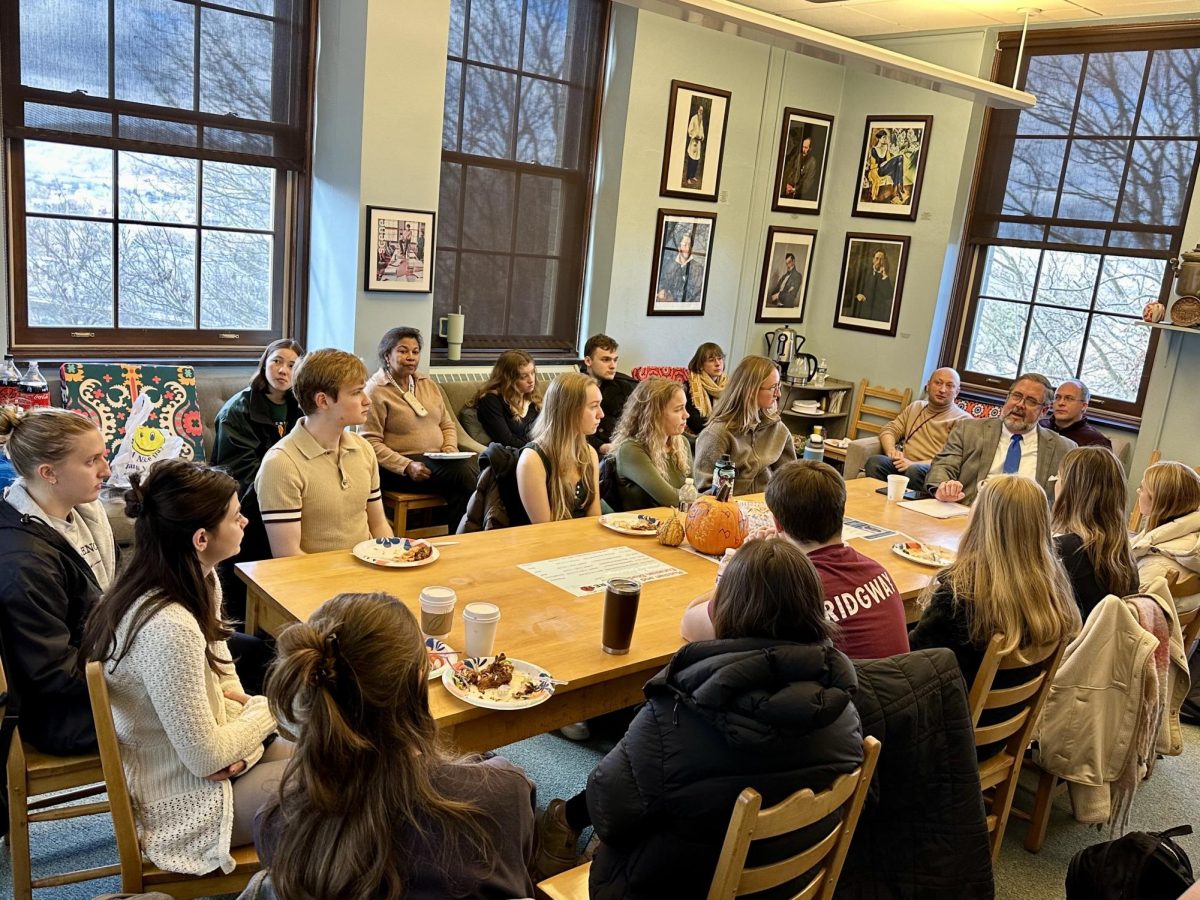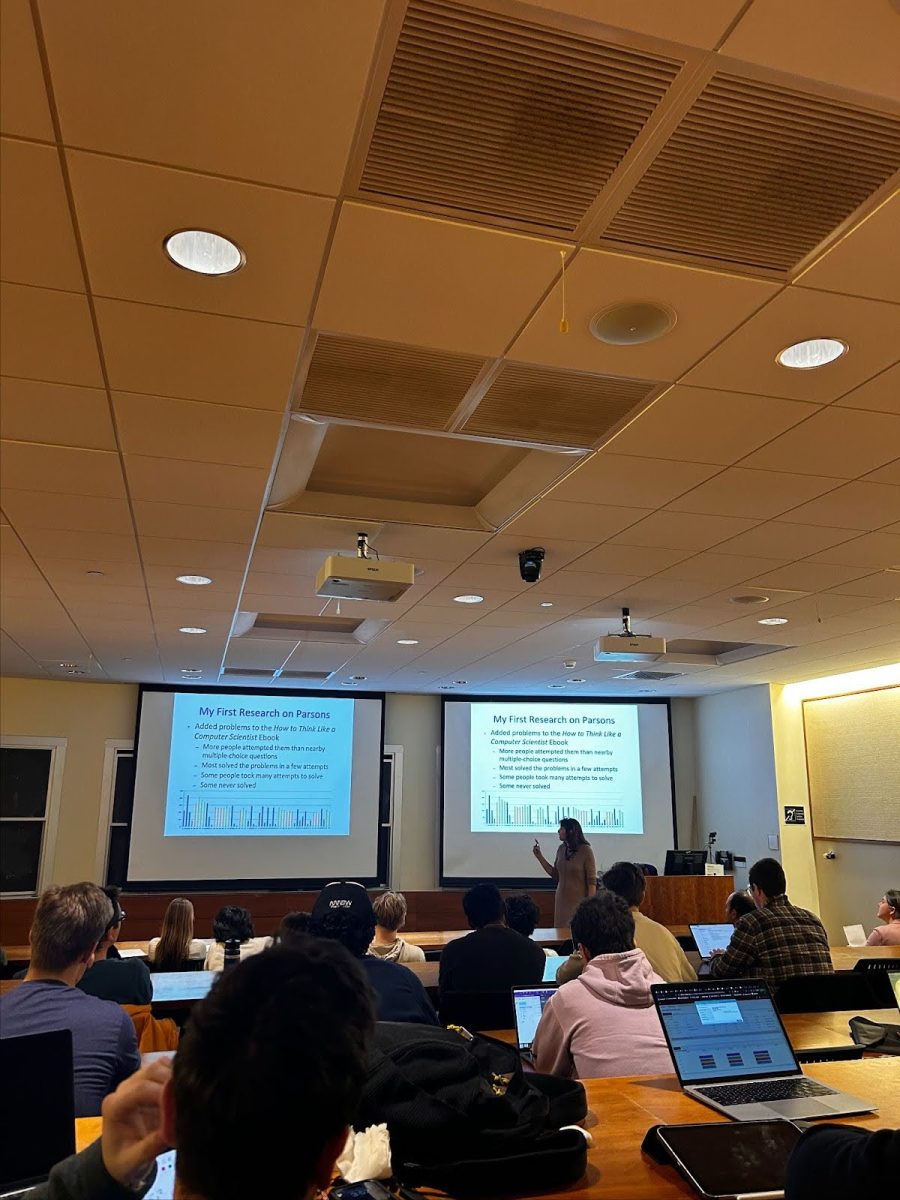Colgate University invited Ira D. Wallach Professor of History at Columbia University Mark Mazower to speak at the annual Douglas K. Reading lecture on Thursday, Oct. 3. The annual lecture is an opportunity for the history department to bring to campus historian doing exciting work at their respective institution. Mazower has several award-winning books, provides commentary on international affairs and reviews books for many publications. His lecture focused on his experiences studying modern Greek history and how the field of study often mimics detective work.
Chair of the History Department Dan Bouk introduced Mazower at the lecture.
“This is our history department’s opportunity every year to bring to campus a historian who is doing exciting work; a chance for us and our wide range of faculty and students to think together about the past, the present and the future of our discipline,” Bouk said.
Mazower reflected on his first travels to Greece in 1976. He was immediately struck by the landscape’s beauty and the people’s warmth. Mazower later narrowed his historical specialty to teaching international history and modern European history in general but remained interested in modern Greek history.
“The stuff that I’ve done has sort of swung between these two extremes, a small country that most people aren’t very interested in and huge grandiose themes that are far from the earth,” Mazower said.
Mazower centered the talk on a research project that grew from his curiosity about a house he saw in a Greek film in 2022. Mazower described this as the strangest piece of research he’s ever conducted. He also explained how the deep fascination he grew for this house encapsulates the idea of different ways to explore a historical topic.
Mazower’s obsession with this house came from a Greek movie which follows a family that inherits a house in the Greek countryside. Mazower was awestruck by the house and developed an unexplainable fixation.
“I developed this kind of obsession. I have to find out where this house is. Is it still there? I had no idea really why,” Mazower said.
From there, Mazower took the audience through his search to find insights into the house. First, with the help of the husband of a friend of Mazower’s, he narrowed the location to an Athens suburb called Kifisia. From there, Mazower learned that the house belonged to the Eftaxias family, a wealthy, upper-middle-class Greek family. Among the many discussion points and tangents Mazower discussed regarding his research, the Eftaxias family was the most significant historical rabbit hole he went down.
Through further research, Mazower learned of a man named Lambros Eftaxias and centered his research around him. Mazower looked up “villa Eftaxias” or “the house of Eftaxias,” hoping to find the house he had been searching for, but it wasn’t the correct house. However, Villa Eftaxias, a beach house, is well known to Greek architects today because it was the first serious modernist building built in Greece by famed architect Aris Konstantinidis . Mazower learned that it was Lambros Eftaxias who commissioned the building.
Mazower’s curiosity about the mysterious Lambros Eftaxias deepened, and he visited the Villa Eftaxia. During his visit to the villa, Mazower observed that the house was in a state of disrepair, which created another question: What happened to Eftaxias and his fortune?
Mazower visited the house where Lambros was born in search of this answer. On his visit to the Eftaxias family home, Mazower noticed that Lambros had a painting of the story of Zeus and Ganymede, a mortal that the Greek god falls in love with. In the early 1900s, this was a popular thing for gay men to display, and the existence of the painting led Mazower to believe that Lambros was gay. For further research, Mazower reviewed old love letters from Lambros addressed to a man named Roddy Henderson.
The Eftaxias family had a strong political influence. Lambros’ uncle held a constituency in central Greece from 1884 to 1930. In hopes of advocating for his mentally ill brother, Lambros served in the Greek Parliament from 1932 to 1967. From 1884 to 1967, a single family controlled the destiny of a district in Greece. Part of this was due to their bankrolling of Konstantinos Karamanlis, the future central figure in center-right politics and prime minister of Greece at the time.
Mazower shared how, during his research, he stumbled onto an old film of a family who had coincidentally rented the Eftaxias house in the summer of 1939. From Air Force aerial photographs of Kifisia in 1923, Mazower discovered the house’s location and traveled to see it.
As he finished chronicling this labyrinthine journey of historical research, Mazower asked an important rhetorical question.
“What does all of this have to do with history?” Mazower said.
Mazower explained that history should aspire to be a science that objectively informs us of the past to prepare us for the present.
“The historian is basically providing the most accurate and objective picture possible of what is in fact out there,” Mazower said.
Students who listened to Mazower’s talk, like first-year Bennett Markenson, also expressed a keen interest in Mazower’s use of history as a detective tool.
“The fact that watching a random film led Mazover to research the house and its architecture, the modernizing of Athens and the fortunes of the Eftaxias family was fascinating to me,” Markenson said.














